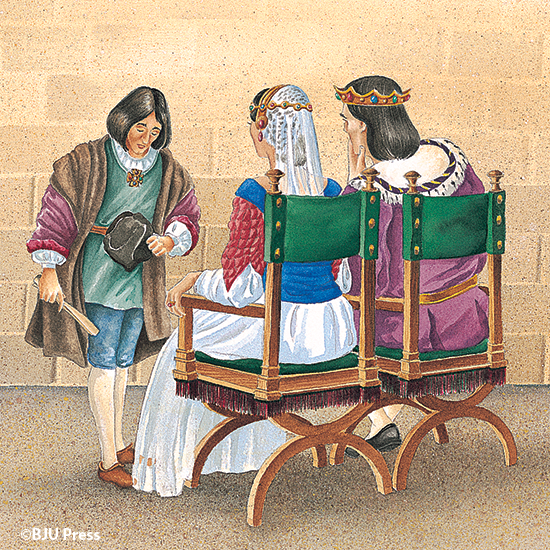Perspective matters in all of education, but it’s particularly clear that perspective impacts teaching about the past. The scene of an accident illustrates on a miniature scale how perspective influences the retelling of an event. Where a witness was standing and what he was doing at the time of the accident will dramatically affect his view of the event. Most historians aren’t eyewitnesses of the events they record, but they do have perspectives that color their narratives.

Christopher Columbus provides an excellent example since historians have many different perspectives about this world figure. My friend Wes wrote a blog post that questioned the morality of Columbus’s actions. But I’d like to discuss two different perspectives taught about Columbus’s scientific knowledge.
Columbus—Heroic Individualist
One educational television show teaches children about Columbus by having an “interview” with him. The man playing the part of the explorer explains that most people in his day thought that the world was flat and that anyone who sailed far enough west would fall off the edge. Columbus, however, believed the world was round and therefore thought he could reach the East Indies by sailing west.
In this widely held perspective, Columbus is seen as a heroic individualist, bucking the religious, intellectual, and political establishments of his time by boldly charting a path based on scientific fact. Secularists like this story because it pits the rationality of science against irrational notions of religion. But those details aren’t accurate. This common perspective on Columbus is one that professional historians are trying to dissuade popular culture from believing.
Columbus—Mistaken Merchant
Actually, the scientific controversy in Columbus’s day wasn’t about the shape of the earth but its size. Most people during that time knew the earth was round but thought it was a little smaller than it really is. Since Columbus was convinced that the earth was much smaller than it is, he believed Asia could be reached faster by sailing west.
The religious/intellectual establishment actually had a more accurate estimate of Earth’s size than Columbus did, but nobody at that time knew there was a large landmass in between Europe and Asia.
I appreciate how BJU Press concludes this historical account in the 3rd edition of Heritage Studies 1 (page 121):
Columbus did not reach Asia by sailing west. Though Columbus did not know where he landed, God did. Columbus did not know he had found new lands to explore. God used the voyage to change the world.
In this telling, Columbus is a mistaken merchant, but God changes the course of human events in a striking way.
Perspective really matters. Some historians want to make people the heroes and ignore what God says and does. As a Christian father, I want my daughters to develop a biblical perspective on the past. This statement from the same textbook (page 123) sums up the perspective I want them to have this holiday.
Columbus Day is celebrated on the second Monday of October. It is a day to remember Christopher Columbus and the land he found. It is a day to remember what God did long ago.
Thank you for sharing the truth about Columbus. I was taught the other version. A good reason to homeschool and use material that starts with the Word of God.